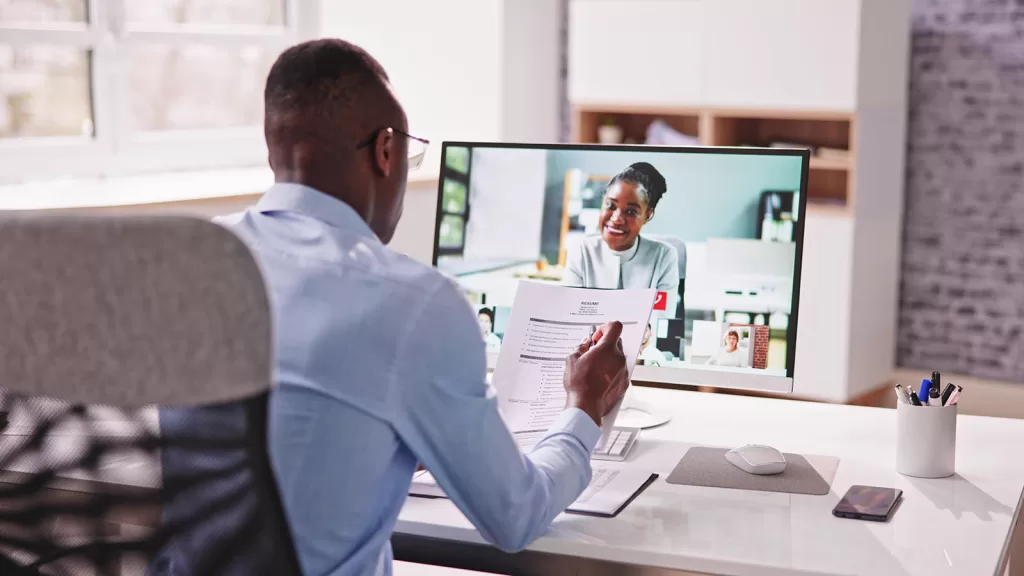Job interviews can be nerve-wracking. You’re competing with others who have similar skills and experience, so how do you make sure you stand out from the crowd?
It turns out, it’s not always about having the most impressive resume.
Sometimes, it’s the little things that can make a big difference. Here are 16 simple and creative ways to leave a lasting impression in your next job interview.
Do Your Homework

Before you step into the interview, make sure you’ve done thorough research on the company. Know their mission, values, products, and recent news. This shows you’re genuinely interested and proactive (and not just interested in collecting a paycheck because everybody wants that).
Mentioning something specific about the company, like one of their newest products, during your interview can really set you apart.
Dress for Success

First impressions are crucial. Dress appropriately for the company culture, but always err on the side of being slightly more formal. If you’re unsure, a business casual outfit is usually a safe bet. Looking polished and professional can boost your confidence and leave a positive impression.
Bring a Portfolio (Or A Notebook)

Even if the job doesn’t traditionally require a portfolio, bringing one can be a game-changer. Include your resume, work samples, letters of recommendation, and any other relevant documents. This shows you’re prepared and serious about the position. Also bring extra paper and a pen so you can take notes if you need to. This also shows organization.
Be Punctual

Arrive 10-15 minutes early. This not only shows you’re reliable but also gives you time to compose yourself before the interview. Being late, on the other hand, can start things off on the wrong foot. And don’t be too early unless you plan to sit in your car until closer to the interview time. You don’t want to seem like you’re rushing your interviewers.
Practice Your Elevator Pitch

Be ready to summarize who you are, what you do, and why you’re a great fit for the job in a concise and compelling way. Practice this elevator pitch so it comes out naturally and confidently, but not necessarily overly rehearsed. A smooth delivery is always best.
For instance: “Hi, I’m Alex, and I’m really passionate about marketing. Over the past five years, I’ve worked with various brands to help them grow their online presence and connect with their target audiences. I love using creative strategies and data-driven insights to drive results. In my last role, I led a campaign that boosted our social media engagement by 40% in just three months. I’m excited about the opportunity to bring my skills and enthusiasm to your team and contribute to your company’s success.”
Ask Thoughtful Questions

Prepare a few insightful questions to ask your interviewer. These should go beyond the basics and show that you’ve thought deeply about the role and the company. Questions about the team’s dynamics, company culture, or recent projects are always good bets.
Use the STAR Method

When answering behavioral questions, use the STAR method (Situation, Task, Action, Result) to structure your responses. This helps you tell a clear, concise story that highlights your skills and achievements.
For instance:
Interviewer: Can you tell me about a time when you had to solve a difficult problem at work?
Candidate: Absolutely. So, last year I was working as a project coordinator for a marketing firm. (Situation)
Our team was in the middle of a major campaign for a big client, and we were just a week away from the launch date when we discovered that one of our key suppliers had shipped the wrong promotional materials. (Task)
I immediately gathered the team to brainstorm solutions. First, I contacted the supplier to understand the scope of the mistake and their ability to correct it quickly. I then reached out to several local vendors to see if they could produce what we needed on short notice. Meanwhile, I kept the client informed about the issue and our efforts to resolve it. (Action)
In the end, we found a local vendor who could meet our requirements and deliver the materials on time. The launch went ahead as scheduled, and the client was very pleased with the outcome. We even received positive feedback for how we handled the crisis. (Result)
So, while it was a stressful situation, it really highlighted the importance of quick thinking, clear communication, and teamwork.
Be Enthusiastic

Show genuine enthusiasm for the role and the company. Smile, maintain good eye contact, and express your excitement about the opportunity. Enthusiasm is contagious and can make you more memorable. You might be surprised at what a genuine smile will do to help you connect with your interviewers.
Highlight Soft Skills

Employers look for soft skills because it’s difficult to teach those (while hard skills can be taught). Technical skills are important, but soft skills like communication, teamwork, and problem-solving are equally valuable. Make sure to highlight these skills through your examples and experiences.
Be A Storyteller

First, stories make you memorable. If you just list your skills and experiences, you might blend in with the other candidates. But if you share a compelling story about a time you overcame a big challenge or made a significant impact, the interviewer is much more likely to remember you.
Secondly, stories showcase your skills in action. Rather than just saying you’re good at teamwork or problem-solving, you can demonstrate it through a real-life example. For instance, if you tell a story about how you led a team through a tough project and managed to meet a tight deadline, you’re not just claiming you have leadership and time-management skills—you’re proving it. This not only helps the interviewer see your abilities clearly but also builds your credibility and trustworthiness.
Show Off Your Personality

Don’t be afraid to let your personality shine through. Companies want to hire someone who will be a good fit with their team, not just a robot. Being yourself can help the interviewer see how you might fit into their workplace.
Follow Up with a Thank-You Note

Always send a thank-you note or email after the interview. Mention specific points from your conversation and reiterate your enthusiasm for the position. This small gesture can go a long way in keeping you top of mind.
For instance:
Subject: Thank You!
Hi [Interviewer’s Name],
I hope this note finds you well. I wanted to take a moment to thank you for the opportunity to interview for the [Job Title] position at [Company Name] yesterday. I really enjoyed our conversation and learning more about the team and the exciting projects you’re working on.
I’m especially excited about the potential to contribute to [specific project or aspect of the job that was discussed]. It’s clear that [Company Name] is doing some innovative work, and I’d love to be a part of it. Our discussion only strengthened my interest in the role and the company.
If you need any more information from me, please don’t hesitate to reach out. I’m looking forward to the possibility of working together and contributing to the team.
Thanks again for your time and consideration.
Best, [Your Name]
Be Prepared for Unusual Questions

Some interviewers like to throw in a curveball question to see how you think on your feet. While you can’t prepare for every odd question, practicing how to stay calm and think critically can help you handle these with grace.
Showcase Your Problem-Solving Skills

Employers love candidates who can think on their feet and solve problems. When discussing your past experiences, highlight situations where you identified a problem and came up with a creative solution.
Build Rapport

Try to find common ground with your interviewer to build rapport. This could be something as simple as a shared interest or experience. Building a connection can make your interview more memorable and pleasant.
Leave a Strong Closing Impression

At the end of the interview, summarize why you’re excited about the role and why you’re a great fit. If they ask you if you have any questions, ask one (don’t say, “I think you’ve already answered all of my questions”).
This final impression can help solidify your candidacy in the interviewer’s mind.



